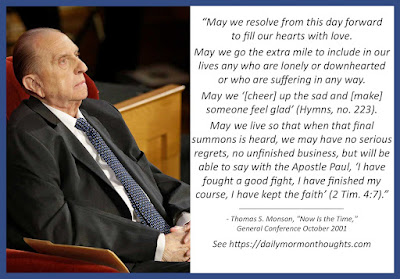"How fragile life, how certain death. We do not know when we will be required to leave this mortal existence. And so I ask, 'What are we doing with today?' If we live only for tomorrow, we'll have a lot of empty yesterdays today. Have we been guilty of declaring, 'I've been thinking about making some course corrections in my life. I plan to take the first step — tomorrow'? With such thinking, tomorrow is forever. Such tomorrows rarely come unless we do something about them today....
"Because life is fragile and death inevitable, we must make the most of each day....
"My brothers and sisters, may we resolve from this day forward to fill our hearts with love. May we go the extra mile to include in our lives any who are lonely or downhearted or who are suffering in any way. May we '[cheer] up the sad and [make] someone feel glad' (Hymns, no. 223). May we live so that when that final summons is heard, we may have no serious regrets, no unfinished business, but will be able to say with the Apostle Paul, 'I have fought a good fight, I have finished my course, I have kept the faith' (2 Tim. 4:7)."
- Thomas S. Monson, "Now Is the Time," Ensign, Nov. 2001, pp. 59-61
Click here to read the full talk
Most of us, if not all, have dealt with the uncertainty of this life, and can appreciate President Monson's warning, "We do not know when we will be required to leave this mortal existence." We have seen loved ones or acquaintances "called home" suddenly or unexpectedly, in what seems to us to be untimely and too early. Given the stark reality of that uncertainty, President Monson reminds us that we should never procrastinate needed changes or our commitments to make the most of each day we are allotted.
This is very practical advice of some of the things we should be considering about how to live life, now, today:
There is much we can do, to share and enrich the lives of others, to support and help those in need. That will add to the richness of our own lives, and prepare us to answer "the final summons" when our time is completed.
(Compilation and commentary by David Kenison, Orem, Utah, 2021)
July 20, 2015
July 20, 2015



No comments:
Post a Comment